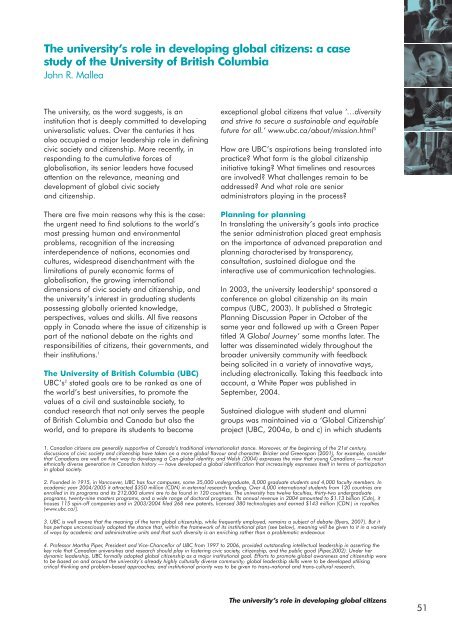HE senior mgrs_Apr18 - Bournemouth University
HE senior mgrs_Apr18 - Bournemouth University
HE senior mgrs_Apr18 - Bournemouth University
You also want an ePaper? Increase the reach of your titles
YUMPU automatically turns print PDFs into web optimized ePapers that Google loves.
The university’s role in developing global citizens: a casestudy of the <strong>University</strong> of British ColumbiaJohn R. MalleaThe university, as the word suggests, is aninstitution that is deeply committed to developinguniversalistic values. Over the centuries it hasalso occupied a major leadership role in definingcivic society and citizenship. More recently, inresponding to the cumulative forces ofglobalisation, its <strong>senior</strong> leaders have focusedattention on the relevance, meaning anddevelopment of global civic societyand citizenship.There are five main reasons why this is the case:the urgent need to find solutions to the world’smost pressing human and environmentalproblems, recognition of the increasinginterdependence of nations, economies andcultures, widespread disenchantment with thelimitations of purely economic forms ofglobalisation, the growing internationaldimensions of civic society and citizenship, andthe university’s interest in graduating studentspossessing globally oriented knowledge,perspectives, values and skills. All five reasonsapply in Canada where the issue of citizenship ispart of the national debate on the rights andresponsibilities of citizens, their governments, andtheir institutions. 1The <strong>University</strong> of British Columbia (UBC)UBC’s 2 stated goals are to be ranked as one ofthe world’s best universities, to promote thevalues of a civil and sustainable society, toconduct research that not only serves the peopleof British Columbia and Canada but also theworld, and to prepare its students to becomeexceptional global citizens that value ‘…diversityand strive to secure a sustainable and equitablefuture for all.’ www.ubc.ca/about/mission.html 3How are UBC’s aspirations being translated intopractice? What form is the global citizenshipinitiative taking? What timelines and resourcesare involved? What challenges remain to beaddressed? And what role are <strong>senior</strong>administrators playing in the process?Planning for planningIn translating the university’s goals into practicethe <strong>senior</strong> administration placed great emphasison the importance of advanced preparation andplanning characterised by transparency,consultation, sustained dialogue and theinteractive use of communication technologies.In 2003, the university leadership 4 sponsored aconference on global citizenship on its maincampus (UBC, 2003). It published a StrategicPlanning Discussion Paper in October of thesame year and followed up with a Green Papertitled ‘A Global Journey’ some months later. Thelatter was disseminated widely throughout thebroader university community with feedbackbeing solicited in a variety of innovative ways,including electronically. Taking this feedback intoaccount, a White Paper was published inSeptember, 2004.Sustained dialogue with student and alumnigroups was maintained via a ‘Global Citizenship’project (UBC, 2004a, b and c) in which students1. Canadian citizens are generally supportive of Canada’s traditional internationalist stance. Moreover, at the beginning of the 21st century,discussions of civic society and citizenship have taken on a more global flavour and character. Bricker and Greenspan (2001), for example, considerthat Canadians are well on their way to developing a Can-global identity; and Welsh (2004) expresses the view that young Canadians — the mostethnically diverse generation in Canadian history — have developed a global identification that increasingly expresses itself in terms of participationin global society.2. Founded in 1915, in Vancouver, UBC has four campuses, some 35,000 undergraduate, 8,000 graduate students and 4,000 faculty members. Inacademic year 2004/2005 it attracted $350 million (CDN) in external research funding. Over 4,000 international students from 120 countries areenrolled in its programs and its 212,000 alumni are to be found in 120 countries. The university has twelve faculties, thirty-two undergraduateprograms, twenty-nine masters programs, and a wide range of doctoral programs. Its annual revenue in 2004 amounted to $1.13 billion (Cdn), ithouses 115 spin-off companies and in 2003/2004 filed 268 new patents, licensed 380 technologies and earned $143 million (CDN.) in royalties(www.ubc.ca/).3. UBC is well aware that the meaning of the term global citizenship, while frequently employed, remains a subject of debate (Byers, 2007). But ithas perhaps unconsciously adopted the stance that, within the framework of its institutional plan (see below), meaning will be given to it in a varietyof ways by academic and administrative units and that such diversity is an enriching rather than a problematic endeavour.4. Professor Martha Piper, President and Vice-Chancellor of UBC from 1997 to 2006, provided outstanding intellectual leadership in asserting thekey role that Canadian universities and research should play in fostering civic society, citizenship, and the public good (Piper,2002). Under herdynamic leadership, UBC formally adopted global citizenship as a major institutional goal. Efforts to promote global awareness and citizenship wereto be based on and around the university’s already highly culturally diverse community; global leadership skills were to be developed utilisingcritical thinking and problem-based approaches; and institutional priority was to be given to trans-national and trans-cultural research.The university’s role in developing global citizens51





![[2012] UKUT 399 (TCC)](https://img.yumpu.com/51352289/1/184x260/2012-ukut-399-tcc.jpg?quality=85)




![Neutral Citation Number: [2009] EWHC 3198 (Ch) Case No: CH ...](https://img.yumpu.com/50120201/1/184x260/neutral-citation-number-2009-ewhc-3198-ch-case-no-ch-.jpg?quality=85)





